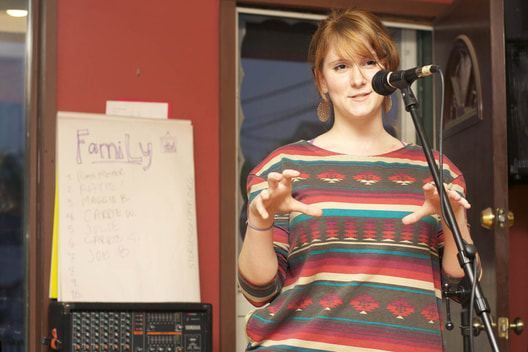Ground RulesStories should be:
Stories on Tap is not:
|
Tips for Storytellers
DECIDING ON A STORY
Not sure which story to tell? Tell us about a time you learned something new at an unexpected moment. Stories can be both funny and poignant, but remember that all good stories show personal growth.
SCARS, NOT WOUNDS
Catherine Burns from The Moth has a saying that the best stories are “scars not wounds.” Stories about wounds are so fresh that they’re unresolved. Try to reflect on moments in your life that you've had some time to process.
PERFORM LIKE YOU'RE SPEAKING TO A FRIEND
To get started, sit down with a pen and paper to organize your story — but don't be tempted to write out the entire story word for word. We recommend writing an introduction, then jotting down bullet points for the action of story. Finish by writing out a last sentence so you can end on a strong note. Then practice! Memorize the intro and closing of your story, but get comfortable enough that you can relax while telling it. Perform like you're speaking to a friend. The best-practiced storytellers are able to respond to audience feedback like unexpected gasps, hoots, and laughs.
FIRST LINE & LAST LINE
Start your story with a first line that grabs the audience's attention and sets the story's conflict. Memorize both your first line and your closing sentence. When you walk on stage, have your closing sentence in your head — because weak endings destroy even the best-told stories. Your final line should leave your audience fulfilled and cheering for you.
"THERE I WAS..."
Be specific. Talk about small sensory and emotional details that show what you felt and experienced. If you’re talking about the time you got caught shoplifting, what was the store clerk wearing? Small details like "The clerk in the blue vest approached me," "I could feel the sweat cold on my neck," and "I was scared" will go a long way in helping the listeners be a part of your story.
ABOUT THAT TIME LIMIT
Please respect the audience and keep your story within the specified time limit. Time yourself when practicing your story at home. Practice at least once in front of others before getting on stage, because our stories often lengthen when we have an audience.
SUBMIT YOUR STORY!
As of 2020, Stories on Tap requires that storytellers sign up before the week of the event. Only ten storytellers will be chosen from the hat, so some storytellers may not have the opportunity to tell their story at every event. We can't wait to hear yours!
Not sure which story to tell? Tell us about a time you learned something new at an unexpected moment. Stories can be both funny and poignant, but remember that all good stories show personal growth.
SCARS, NOT WOUNDS
Catherine Burns from The Moth has a saying that the best stories are “scars not wounds.” Stories about wounds are so fresh that they’re unresolved. Try to reflect on moments in your life that you've had some time to process.
PERFORM LIKE YOU'RE SPEAKING TO A FRIEND
To get started, sit down with a pen and paper to organize your story — but don't be tempted to write out the entire story word for word. We recommend writing an introduction, then jotting down bullet points for the action of story. Finish by writing out a last sentence so you can end on a strong note. Then practice! Memorize the intro and closing of your story, but get comfortable enough that you can relax while telling it. Perform like you're speaking to a friend. The best-practiced storytellers are able to respond to audience feedback like unexpected gasps, hoots, and laughs.
FIRST LINE & LAST LINE
Start your story with a first line that grabs the audience's attention and sets the story's conflict. Memorize both your first line and your closing sentence. When you walk on stage, have your closing sentence in your head — because weak endings destroy even the best-told stories. Your final line should leave your audience fulfilled and cheering for you.
"THERE I WAS..."
Be specific. Talk about small sensory and emotional details that show what you felt and experienced. If you’re talking about the time you got caught shoplifting, what was the store clerk wearing? Small details like "The clerk in the blue vest approached me," "I could feel the sweat cold on my neck," and "I was scared" will go a long way in helping the listeners be a part of your story.
ABOUT THAT TIME LIMIT
Please respect the audience and keep your story within the specified time limit. Time yourself when practicing your story at home. Practice at least once in front of others before getting on stage, because our stories often lengthen when we have an audience.
SUBMIT YOUR STORY!
As of 2020, Stories on Tap requires that storytellers sign up before the week of the event. Only ten storytellers will be chosen from the hat, so some storytellers may not have the opportunity to tell their story at every event. We can't wait to hear yours!

